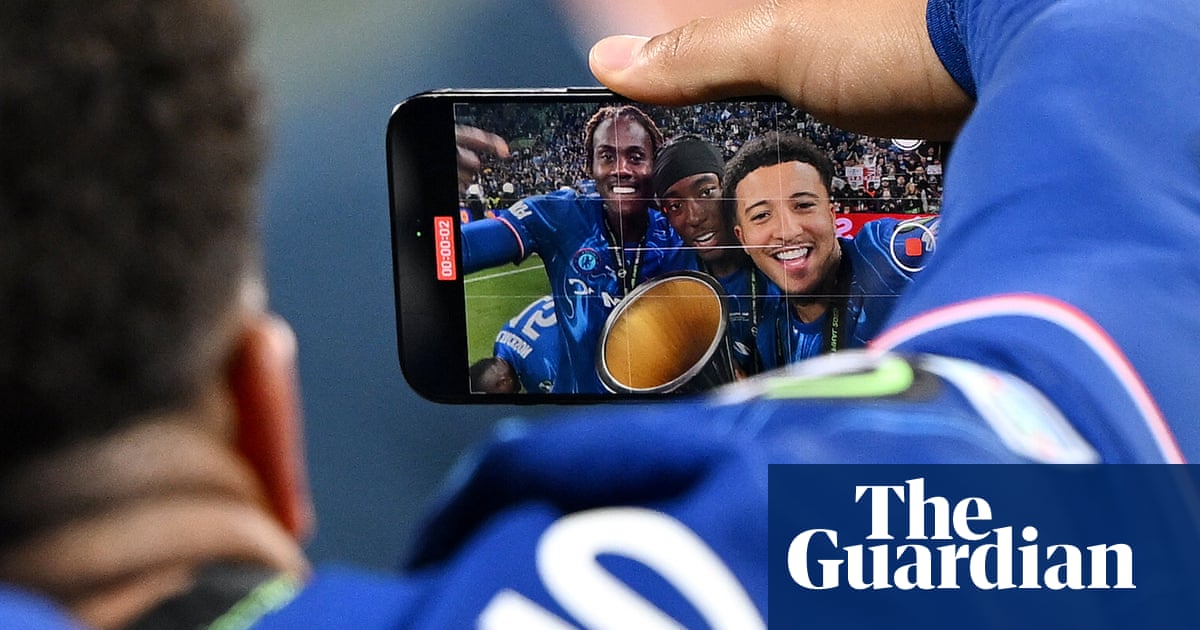The best way to respond to Chelsea having to pay a £5m penalty fee because of their failure to meet a £25m obligation to buy Jadon Sancho fromManchester Unitedis with a shrug.
There is no tale of excess, no evidence of scattergun thinking from the recruitment team at Stamford Bridge, no stick with which to beat Todd Boehly. In fact it is not even much of a punishment. A penalty clause is one way of framing it; another is that it is the equivalent of a standard loan fee and that allChelseaare doing is making a delayed payment after not being asked for one when the deal to borrow Sancho went through on the final day of last summer’s transfer window.
This is no drama; it is merely Chelsea benefiting from predicting how things with Sancho could play out. They saw the upside but knew there were potential drawbacks. Sancho represented risk. He had struggled at United afterjoining from Borussia Dortmund in 2021. He had clashed with Erik ten Hag,who was critical of the attacker’s output in training. It is no secret that United were eager sellers. They will be far from delighted that Sancho, who has a year left on his lucrative deal, is their problem to solve again.
If only Sancho could have done more to convince Chelsea to sign him. He was happy to be back in London and the early signs were positive. He impressed on debut, coming off the bench to set up Christopher Nkunku’s winner at Bournemouth, and it seemed that leaving United had lifted a weight from his shoulders. There were no complaints about Sancho’s attitude. He looked sharper, lighter and hungrier on the left of Enzo Maresca’s attack. A lovely goal to spark Chelsea’s comeback in their 4-3 win over Tottenham last December seemed to point to a player finally ready to prove he could thrive in English football.
Yet Sancho could not sustain it. He faded after Christmas, confidence slipping away. His effectiveness dipped and he went 780 minutes without a shot on target. He looked diffident. Sancho has brilliant feet and plenty of imagination but there are times when he looks reluctant to drive at his full-back and takes the safe option. Does he truly back himself? The sense is that he is not quite suited to the intensity of the Premier League. He is quick but does not have an explosive turn of speed. He is not going to bomb up and down the flank. He is not a winger who is going to leave a Premier League defender trailing in his wake. Sancho’s talent is more subtle; there is a reason why he has been more productive in the Bundesliga.
Chelsea clocked it. This has not been a disastrous loan. Sancho made 41 appearances, scored five goals and registered 10 assists. He was in and out of the starting lineup during the run-in but played his part in Chelsea qualifying for the Champions League.His equaliser in the 2-2 draw with Ipswichin April looks more important now than it did at the time.
Sancho will have fond memories of his time at Chelsea. He leaves on a high after coming on to score Chelsea’s third inlast week’s 4-1 victory over Real Betis in the Conference League final.
But one fine goal against Betis, whose team is full of Premier League cast-offs, was not enough to change Chelsea’s mind. They appreciated Sancho’s talent and feel that £5m is decent value for a solid enough season, but concerns over his consistency never went away. Chelsea know they can do better. It was worth having a close look at Sancho, who filled a hole in Maresca’s squad, but it would have been a mistake to hand him a long deal. Sancho is 25. He has drifted away from the England squad and is not a prospect any more. He should be approaching his peak but is still finding his way. Chelsea were right to bring him in and, having held unsuccessful talks with Sancho over joining on lower pay, are right to walk away.
Sign up toFootball Daily
Kick off your evenings with the Guardian's take on the world of football
after newsletter promotion
A right-footed left-winger is a priority for Maresca, who is also unable to call upon Mykhailo Mudryk after theUkrainian’s provisional suspension for failing a drug test. Chelsea are monitoringDortmund’s Jamie Gittens, who is 20, and have other options. They are looking to build on a successful season. That means upgrading on Sancho.
United will presumably take a similar approach. This is unlikely to be a joyful reunion. Ten Hag has made way for Ruben Amorim but it is hard to imagine Sancho returning to Manchester with a spring in his step. United are preparing for a revamp –Matheus Cunha will join from Wolvesand could be followed by Brentford’s Bryan Mbeumo – and there is no obvious place for Sancho in Amorim’s 3-4-3 system.
Few anticipate Amorim wanting to assess the situation during pre-season. A swift parting of the ways would surely be for the best. Time will not have healed Sancho’s damaged relationship with United. Both parties have to find a solution in a market, short of obvious buyers at home and abroad. Both will regret Chelsea not stumping up that £25m.
